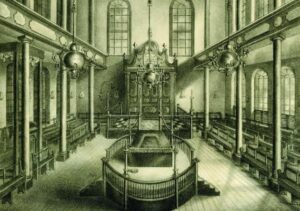Contributor(s): Shared on: 14 October 2021 under the Creative Commons Zero (CC 0) Universal license a Public Domain dedication Categories: Tags: | Contribute a translation | Source (English) |
|---|
|
O’er the earth from Heaven extending
See the light of Truth descending
Sent by the Eternal hand!
Prayers of Peace have reach’d his dwelling
See the clouds are fast dispelling.
Man is blest by his command. | |
Bigot breath too long has mock’d him.
Impious tongues no more shall scoff him.
But in joyful strains of love,
Every heart in fear and trembling
Every thought and voice commingling,
Shall ascend his throne above. |
This hymn was first written by David Nunes Carvalho for the second anniversary celebration of the establishment of the Reformed Society of Israelites (ca. 1825-26). The text of the hymn appears under the title of “Light of Truth” in the Cohn lithograph (The Isaac Harby Prayerbook, Edward Cohn, Ḳ.Ḳ. Beth Elohim 1974) and under the title “Glad Tidings” in the Carvalho Holograph. Many thanks to the American Jewish Archives for providing access to the manuscript. –Aharon Varady Source(s) Light of Truth (David Nunes Carvalho – Cohn Lithograph 1826)  Glad Tidings (David Nunes Carvalho – Carvalho Holograph 1826)
David Nunes Carvalho (1784-1860), born and educated in London, England, was a merchant, author, and ḥazzan for the Reformed Society of Israelites in Charleston, South Carolina, the first Reform congregation in the United States. He helped to compile the first Reform prayerbook in English, the fourth oldest Reform prayerbook in the world. The Reformed Society of Israelites (1824-1833) was a group of forty-seven congregants of Ḳ.Ḳ. Beth Elohim, Charleston, South Carolina, who gathered in late 1824 to petition the congregation to modify the service of prayers with an adapted liturgy emphasizing English translations, original hymns, and other modifications. Among other reforms, the group called for shorter services and sermons conducted in English that would relate the weekly parashah to everyday life. Prominent leaders in the group were Isaac Harby (1788–1828), Abraham Moïse (1799-1869), and David Nunes Carvalho (1784-1860). After Harby's death in 1828, the group published a prayerbook (later reprinted by Barnett Elzas/Bloch in 1916). In 1833, the group dissolved but in rejoining Beth Elohim they also managed to succeed in their original mission in putting the congregation on a firm Reform movement trajectory. Aharon Varady (M.A.J.Ed./JTSA Davidson) is a volunteer transcriber for the Open Siddur Project. If you find any mistakes in his transcriptions, please let him know. Shgiyot mi yavin; Ministarot naqeni שְׁגִיאוֹת מִי־יָבִין; מִנִּסְתָּרוֹת נַקֵּנִי "Who can know all one's flaws? From hidden errors, correct me" (Psalms 19:13). If you'd like to directly support his work, please consider donating via his Patreon account. (Varady also translates prayers and contributes his own original work besides serving as the primary shammes of the Open Siddur Project and its website, opensiddur.org.) Read a comment / Leave a comment (moderated) Works of related interest: |







Leave a Reply